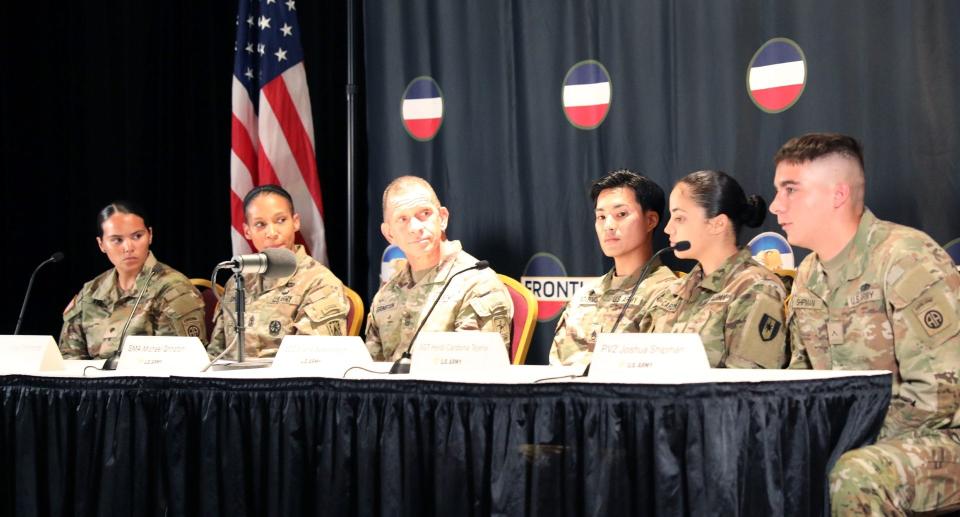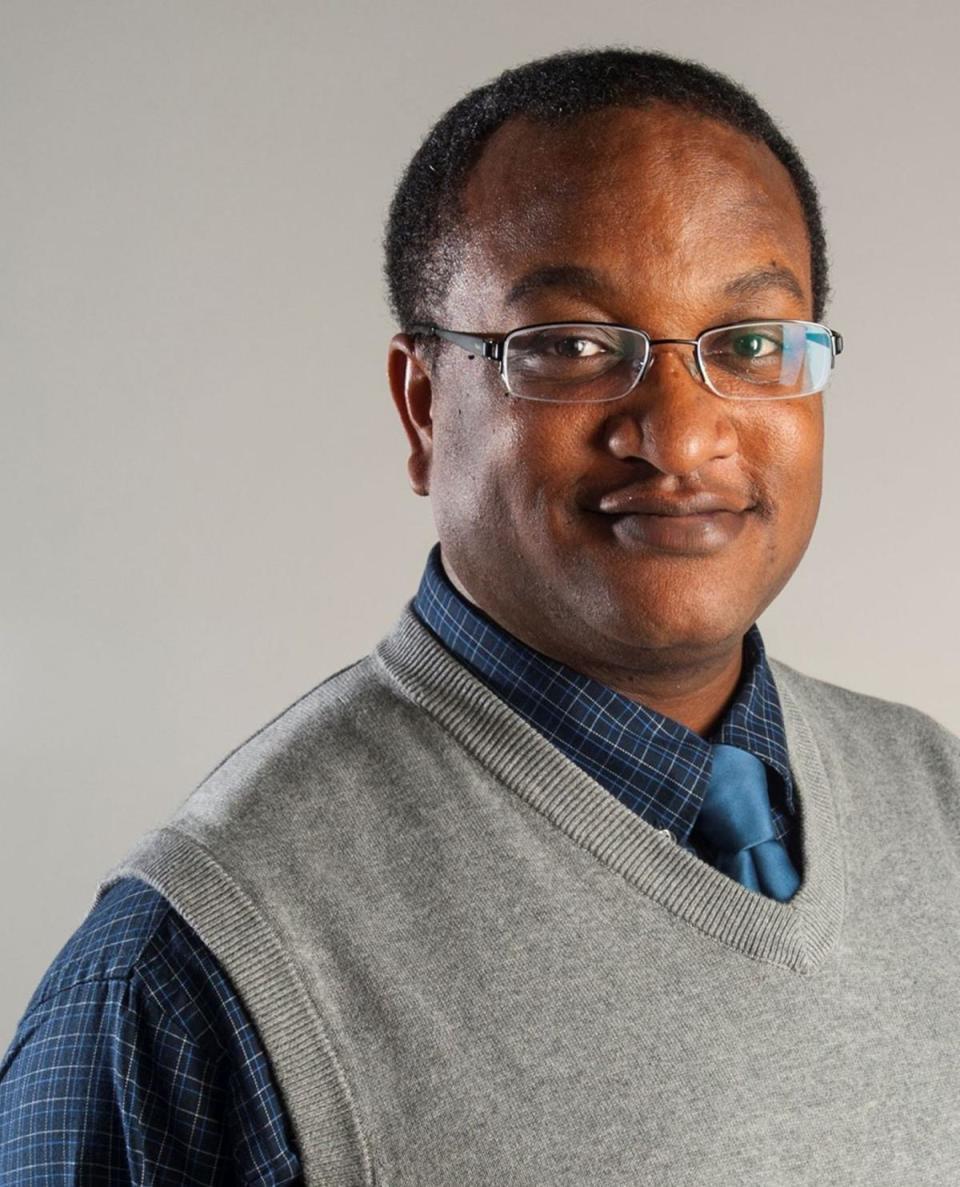Pitts: 75 years ago, the military integrated. The Sergeant Major of the Army, others talk impact
- Oops!Something went wrong.Please try again later.
On July 26 1948, President Harry Truman issued an executive order that desegregated the U.S. Armed Forces.
But at Fort Liberty, formerly known as Fort Bragg, the paratroopers were a step ahead. Four years prior, the 555th Parachute Infantry Battalion was established. The famed “Triple Nickles” was a Black unit of paratroopers that made the 82nd Airborne the first integrated combat unit.
That was a pretty cool detail to hear on Thursday morning at a panel discussion I attended on the 75th Anniversary of the Promise of an Integrated U.S. Army. The panel included Sgt. Maj. of the Army, Michael Grinston, the top enlisted soldier, and was part of the Association of the United States Army Warfighter Summit & Exposition that was held over several days last week at the Crown Expo Center in Fayetteville.

Also on the panel were younger soldiers whose personal biographies showcased the wide-ranging diversity in the U.S. military. Panelists were Spc. Araya Ayala, Staff Sgt. Shane Patasomcit, Pvt. Joshua Shipman, First Sgt. Janina Simmons and Sgt. Heidi Cardona Tejera.
Sgt. First Class Will Reinier, the public affairs adviser for Grinston, served as moderator.
A couple dozen Fort Liberty soldiers were in the audience to listen and share their own thoughts about the impact of Truman's Executive Orders 9980 and 9981, which ended segregation in the military and federal workforce.

Grinston has said he struggled with his racial identity growing up biracial — his mother is white, his dad Black. During the panel, Grinston and others talked about how leadership meant engaging with soldiers — whatever their background.
“I think, initially, diversity is a number,” he said. “Inclusion means — I actually listen to people.”
Putting in the work
Several panelists talked about the importance of inclusion. But the overall message I heard from them was that focus on the military mission is the priority. Keep the mission the priority, they said, and a lot of the other aspects of making a unit cohesive will take care of itself.
Grinston encouraged the panelists and Fort Liberty soldiers to become the “absolute expert” in their fields. Later, he encouraged the soldiers in attendance to strive to complete their Expert Infantryman, Expert Field Medical and Expert Soldier badges.
“As a staff sergeant, nobody should know your job better than you — no one,” he said. He said that when he was a staff sergeant, “I would have challenged anybody in the Army on my job. And I did on multiple times. Sometimes it caused me to do some pushups.”
As the first African American female Army ranger, First Sgt Janina Simmons, who was on the panel, said it was humbling to think 75 years ago, “I wouldn’t be here ... I’m a triple threat: Black, woman, gay.”
She thanked the people who opened the door for soldiers like her.
“I’m pretty sure 75 years ago, nobody was thinking ‘female Rangers.’ It’s impossible,” she said. “With that door being open, I have to take pride in that. I have to not only open the door, (and) walk through the door, I have to pave the way for somebody else.”
But, she said, success in uniform does not come down to age, gender, race or anything like that. It is all about work ethic, she said.
“It is about personal courage, to just toeing the line. Do you have what it takes to just show up?" she said.
“Toe the line and put in the work.”
Everybody, from everywhere
Pvt. Shipman, another panelist, is white and from a small town in Arkansas. Reinier asked him how he found fitting into Army life as a 17-year-old. Being so young was the main adjustment Shipman said: “That kind of threw me off guard.”
But, he said, the transition into his first unit was relatively easy and described the experience as being greeted with open arms. “It was never a problem of falling into the puzzle, I guess,” he said.
He cited the positive influence of his roommate.
“He was the team leader at the time,” he said. “He always helped me just square all my stuff away.”
In answer to a question from Reinier, Shipman said where he came from was not very diverse, but he also never had a problem accepting people.
He said one of his best friends in his first unit was from Cuba.
“I helped him, introduced him to our culture and he tried his best to introduce me to theirs," he said.
“I like that just everybody comes from everywhere.”
A good look
I can say the panel and the discussion were a good look for the Army.
I feel that, even as Defense Secretary Lloyd Austin explicitly works on rooting out white nationalism in the military ranks, there are many more service members who “get it” — that diverse backgrounds strengthen our Armed Forces and represent an opportunity that many companies would love to have.
I was especially heartened to hear from the young soldiers who sounded like they are on good solid footing in at least having a discussion about strength through diversity.
Simmons said no institution, including the Army, is perfect, and there is a lot more work to do.
Asked how to build a cohesive team, she answered: “That starts with you have to get to know your soldiers, and I'm talking beyond the, 'Hey, how ya doing.
“Get to know your soldiers, where do they come from, Puerto Rico, Africa, Germany, what have you. Once you get to know them, you'll know what makes them tick, how they operate. The great thing about the Army, it's just an awesome melting pot."
And one that has come a long way in 75 years.
Myron B. Pitts can be reached at mpitts@fayobserver.com or 910-486-3559.
This article originally appeared on The Fayetteville Observer: Pitts: Sergeant Major of the Army talks anniversary of integration

